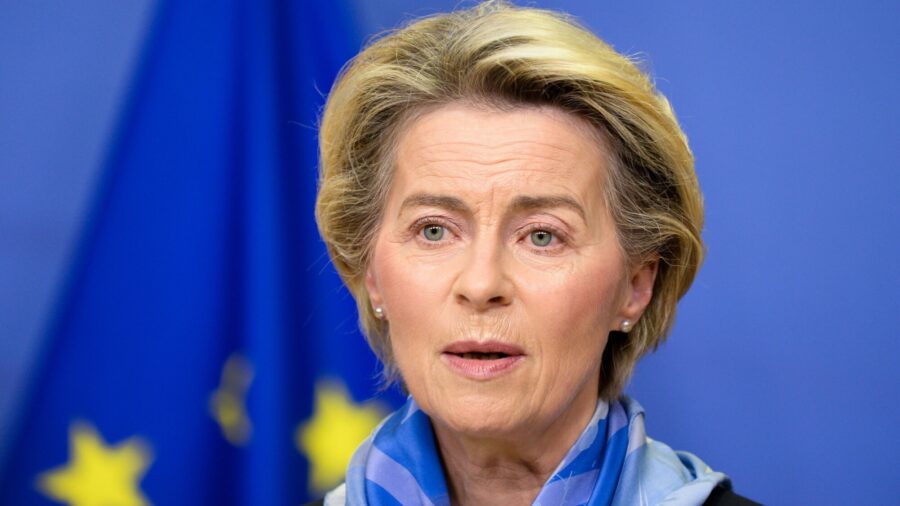The European Union condemned the Chinese regime’s human rights record during a recent meeting, while the latter tried to court more trade and investment with central and eastern European countries.
Around the same time, France sent a warship and submarine to the South China Sea for a “freedom of navigation” patrol, to Beijing’s ire.
Some China analysts said these moves indicated that European countries, though eager to do business with China, were also taking a strong stance against Beijing’s aggressions.
Wang-Borrell Conference
China’s foreign minister Wang Yi and EU High Representative for Foreign Affairs and Security Policy Josep Borrell held a video conference on Feb. 8.
According to the EU statement about the conference, Borrell stressed the EU’s “strong concerns about the ongoing pressure on democracy and fundamental rights in Hong Kong, the treatment of human rights defenders, as well as the treatment of ethnic and religious minorities, in particular in Xinjiang.”
About one million Uyghurs and other Muslim-practicing ethnic minorities in the Xinjiang region are currently detained inside concentration camps, according to United Nations estimates.
Beijing’s statement about the conference noted that Wang emphasized that the issues of Hong Kong, human rights, and Xinjiang are all China’s “domestic affairs.”
“China opposes other countries interfering in our internal affairs and concocting or disseminating lies and fake information,” according to the statement.
Chinese state media have framed Western media and government reports about rights abuses in Xinjiang as fake news.
Borrell called for the release of politicians in Burma who were detained following the military coup, and expressed “deep concern about Iran’s nuclear trajectory,” according to the EU statement. Borrell also “underlined the EU’s strong bonds with the U.S.”
The Chinese side said in its statement they “shared opinions on relations with the U.S., Burma, and Iran,” but did not provide further details.
Beijing’s statement mainly focused on Wang’s opinions about EU-China relations, which the EU statement did not review.
“China and the EU are two large independent forces in the world,” the Chinese statement quoted Wang as saying. “As long as China and the EU adhere to our common interests and make decisions independently, we can accomplish great things.”
U.S.-based China affairs commentator Tang Jingyuan said that EU-China relations are headed in the direction of US-China, with more notable tensions.
“In military, human rights, territorial disputes, and such issues of hard power, China is the U.S. and EU’s enemy. But in trade and technological development, China is more like a partner, rather than a rival,” Tang said.
In March 2019, the EU for the first time called China a “systemic rival promoting alternative models of governance” and “an economic competitor,” highlighting its pursuit of technological dominance.
Tang noted France’s unusual move on Feb. 8, whereby it sent a warship and a nuclear submarine to the South China Sea to conduct a “freedom of navigation” patrol. The Chinese regime claims most of the waterway as its territory, despite several other Asian countries also having claims there.
The French defense minister Florence Parly posted photos of the two naval craft on Twitter. “It’s proof of our navy’s capability to sail far away and sail for a long time, with our strategic partners, who are the Australians, Americans, and Japanese.”
Beijing condemned the move at a Feb. 9 press briefing.

Xi’s Promise
Also on Feb. 9, Chinese leader Xi Jinping hosted a video conference for the Cooperation between China and Central and Eastern European Countries (China-CEEC) Summit.
The China-CEEC Summit is an annual conference with the leaders of Albania, Bosnia and Herzegovina, Bulgaria, Croatia, Czech Republic, Estonia, Greece, Hungary, Latvia, Lithuania, North Macedonia, Montenegro, Poland, Romania, Serbia, Slovakia, Slovenia, and China. The summit was first organized in 2012.
In Xi’s speech, he reviewed the nine-year history of the summit and promised: “China plans to import $170 billion valued products from central and eastern Europe in the next five years.”
He also said China would seek to import double the amount of agricultural products from central and eastern Europe within the next five years.
The Chinese regime has issued limited data on its trade with CEEC countries. The latest data was announced in February 2017: the total trade volume in 2016 was valued at $58.65 billion, with China exporting $45.54 billion and importing $13.11 billion—meaning China had a $32.43 billion trade surplus.
Now, China is claiming to narrow that trade gap.
Spokesperson for China’s commerce ministry Gao Feng said at a Feb. 5 press conference that the trade between China and the 17 CEEC countries reached $103.45 billion in 2020, which was 8.4 percent higher than the value in 2019.
If the trade between China and CEEC keeps on increasing at 8.4 percent each year, the total trade from 2021 to 2025 will be $663.15 billion. If over five years China imports $170 billion from CEEC, then China will export $493.15 billion ($663.15 billion minus $170 billion) to CEEC. China’s trade surplus will be $323.15 billion.
In recent years, Beijing has courted closer economic ties with central and eastern European nations, mostly through tech and infrastructure project investments.
Former U.S. state secretary Mike Pompeo had sought to convince such nations of the security risks that come with doing business with China. In particular, he pushed for European nations to reject 5G telecom equipment from Chinese tech giant Huawei.
From The Epoch Times

